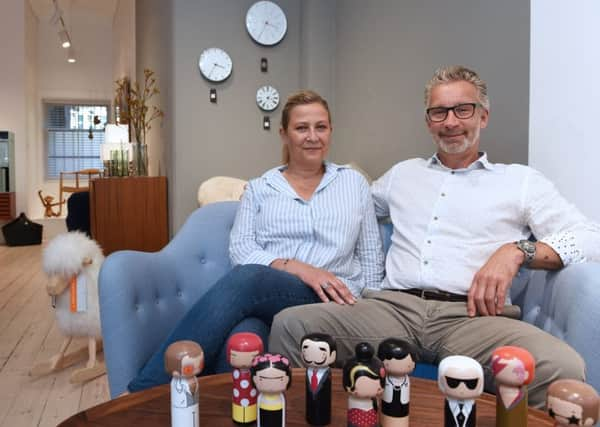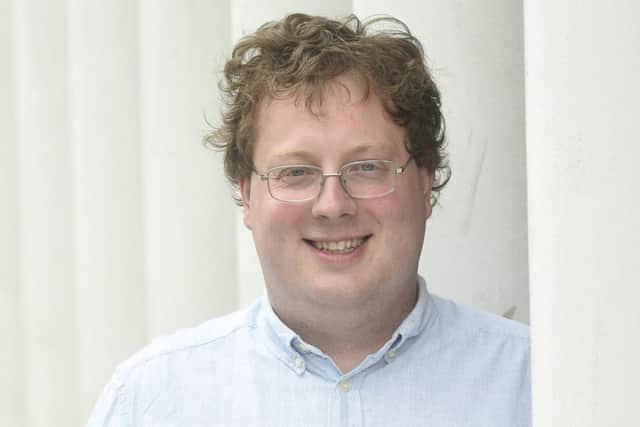Insight: Immigrants in Scotland face the Brexit dilemma


Immigration is a subject that can provoke intensely emotional responses given its central importance to the national economy. Perhaps more than any other issue, it was regularly cited in the debate ahead of the 2016 referendum on whether the UK should remain a European Union member.
In the three years since a narrow majority backed Brexit, a barrage of statistics have been cited by both sides of an increasingly polarised debate to support their views on who should, or should not be allowed, to settle in the UK.
Advertisement
Hide AdAdvertisement
Hide AdThe laws governing immigration are reserved to Westminster. Holyrood ministers have made repeated calls for Scotland to be allowed to set its own immigration policies, citing evidence of the country’s ageing population and shrinking birth rate.


Hospitals, universities and the private sector have all become reliant, to varying degrees, on staff who move to Scotland from overseas.
What happens if this flow of workers is substantially reduced post-Brexit is the subject of intense political argument.
But one voice has been largely absent from the great immigration debate – that of immigrants themselves. Scotland on Sunday has spoken to several people, from a variety of backgrounds who have all moved from overseas to live and work north of the border.
They were asked to share their stories of how they arrived in Scotland and their chosen field of work, and how they thought Brexit would impact on their jobs in the future.


While three are committed to remaining in Scotland, one has recently left, citing the stalled Brexit process as the main reason for their departure. Like the country at large, none of them know exactly what leaving the European Union will ultimately mean in the long term.
THE SMALLBUSINESS OWNER
Sofie and Mogens Kleberg
Sofie and Mogens Kleberg moved from Copenhagen to Edinburgh last year to open a small business in the city’s popular Bruntsfield district.
The couple are concerned that a potential no-deal Brexit could have an adverse impact on their firm, which imports home furnishings from Nordic countries. Nevertheless, the couple are determined to remain in Scotland come what may.
Advertisement
Hide AdAdvertisement
Hide Ad“A lot of our friends thought we were crazy by moving here with this going on,” Sofie explains. “But we love it. We have signed a lease for 10 years so we are making a go of it.”
The Klebergs already had family links to Scotland. “We made the decision two years ago that this was something that we wanted to do,” she adds.
“My daughter, Laura, got engaged to a young man from Scotland, so we started visiting and soon fell in love with the place.”
Asked what it is that appeals to her about Scotland, she cites “the very friendly and open people”.
“Bruntsfield is like a little community,” she adds. “We have been welcomed here and accepted. I only have good things to say about the treatment we have received.”
Establishing a business while still based overseas is no easy feat, but the Klebergs were pleasantly surprised at how straightforward the process was in the UK.
While Brexit was at the back of their minds, it did not put them off. “Maybe I’m naive,” Sofie says. “But I keep telling myself that something will happen at the 11th hour.
“My husband and I have been in the transport business for many years, so we know all about customs clearance. If that’s something we will have to do more of, then we will just have to get on with it.
Advertisement
Hide AdAdvertisement
Hide Ad“What worries me is that it will take extra time to import goods to the UK – and most of them are coming in via Dover. It could add a week to our deliveries.
“Of course, there will be additional costs – and in the end it is always the consumer who ends up having to pay for that.
“Customers are already a bit cautious about spending money as they don’t know what will happen. We’ve spoken with neighbouring businesses and they agree – you sense people are holding back.”
It’s an issue across the UK. Britain’s retailers have recorded the longest period of falling sales for almost eight years, fuelling mounting concern for the economy ahead of Brexit.
The Confederation of British Industry said retail sales across the country had dropped for a third month running in July, marking the longest period for sliding sales since 2011.
“I’m not from here – but I feel people have voted for something that they are clearly not going to get,” says Sofie. “In my opinion, they should really bring it back to the people for another vote.”
THE ACADEMIC
Pavel Iosad
Pavel Iosad is a lecturer and linguistics expert at the University of Edinburgh, where he has worked for the past six years. Born in Moscow, he is a Russian citizen but was granted settled status to remain in the UK in 2018. He expects to become a naturalised British citizen next year.
Iosad lives in the capital with his wife, who is also undergoing the process to become settled, and his two children. To date, they have spent almost £10,000 on visa fees.
Advertisement
Hide AdAdvertisement
Hide AdThe academic moved to Scotland when he secured a job at Edinburgh, Scotland’s fourth oldest university, and an institution consistently ranked among the top 100 in the world.
“My time in the UK started with my job,” he explains. “In my position, you can’t just move and start looking for employment. In terms of my role, it is the best I could get in my field.
“I am exactly where I dreamed of being in terms of how good the department and the university are.”
Iosad previously worked in Norway, which is not a member of the European Union but is part of the Schengen Area – meaning it was possible to travel across the EU without a visa.
“Edinburgh has a reputation as a great place to live so I was very much looking forward to moving here,” he adds.
“Scottish universities have a great reputation. If you are an academic, moving to Scotland is very attractive.”
The higher education sector north of the border has expanded rapidly in the past 30 years, with the country now home to 15 campus-based universities as well as several specialist institutions such as Glasgow School of Art.
Around eight per cent of undergraduates are from the EU, while 20 per cent of teaching and research staff hail from the bloc.
Advertisement
Hide AdAdvertisement
Hide AdThe Scottish Government has agreed that new EU students who begin courses in 2019 will get free tuition for the duration of their studies. But it is unclear what happens in the longer term.
The Scottish Funding Council, which helps fund universities, has warned that academics from the EU may already be leaving their jobs because of Brexit, based on anecdotal evidence.
As a non-EU citizen, Iosad is already well-versed in applying for the kind of visas which could become commonplace for any prospective undergraduate or academic planning to move to Scotland after Brexit.
“It can be an expensive, nerve-wrecking process,” he says. “I am in a privileged position. I have a good job and so does my wife. But we were still concerned about the impact of fees, which were high before Brexit.
“The further down the academic grades you go, it is essentially becoming impossible.”
THE DOCTOR
Mustafa El Sheikh
Mustafa El Sheikh is a foundation doctor based at Ninewells Hospital in Dundee. He has lived in Tayside for the past three years and plans to remain in the city upon completion of his training.
The 25-year-old is the son of Sudanese parents but was brought up in the Republic of Ireland, where his father – also a doctor – had moved for work.
The El Sheikhs are originally from Omdurman, the second largest city in Sudan, where Mustafa returned to complete his studies.
Advertisement
Hide AdAdvertisement
Hide AdBy time he had finished his time at medical school, his father was living and working in Scotland as an osteopathic gynaecologist.
“There is a joke that Sudan is a great exporter of doctors,” Mustafa explains. “It is fairly common for those in the medical profession to pursue their career overseas, as opportunities for progression are maybe not so great in their homeland.
“My dad left Sudan at a young age to give his career a better shot – but also to provide better opportunities for his family.”
The NHS has relied upon skilled migrants throughout its history. Mustafa, who has Irish citizenship, is one of around 17,000 EU nationals working in health and social care in Scotland.
While that equals less than five per cent of the workforce, the proportion is far higher in some specialisms.
But the situation is complicated as NHS Scotland does not routinely record the nationality of its staff.
A recent report by the House of Commons Library illustrates how much the wider health service relies upon workers from overseas. In the NHS in England, just over one in eight staff reported having non-British nationality – around 153,000 out of 1.2 million.
In April, Holyrood’s Health Secretary Jeane Freeman wrote to Europeans working in the health service to reassure them they would be supported to remain in Scotland regardless of the outcome of Brexit.
Advertisement
Hide AdAdvertisement
Hide Ad“Scotland has been good to me and my family,” says Mustafa. “I feel privileged to be in a position where I can give back by working in the medical profession to help Scottish people, who I love.
“But from what I can gather, Brexit is making immigration harder, it’s making people’s futures uncertain. I don’t advocate that. The NHS is a great thing and is supported by people moving here to work.”
THE MARKETING EXECUTIVE
Vincent Hartman
Vincent Hartman recently moved back to the Netherlands after living in Scotland for three years and in England for five years before that. He had crossed the North Sea to establish an office in Northampton for a Dutch office seat manufacturer, choosing the English town for logistical reasons.
The marketing executive eventually settled in Stirling with his wife and children, working for several Scottish firms. He freely admits that Brexit was the main reason for his decision to leave.
Dutch people have been resident in Scotland for centuries. Before the 1707 Act of Union, the Netherlands was one of the principal trading nations with the old Kingdom of Scotland.
The 2011 census found there were around 4,100 Dutch living north of the border, although that figure is likely to have risen in the years since.
The result of the 2016 referendum came as a shock to Hartman, 53, but he was initially confident that a deal could be reached.
“I couldn’t believe it at first,” he said. “But I trusted the outcome would be a fair and reasonable compromise.
Advertisement
Hide AdAdvertisement
Hide Ad“I expected the Conservatives to be more pragmatic in relation to the economic outcome – but instead they have been taken over by the far right.
“It is sad that can happen with a first-past-the-post electoral system. We have far right and far left voters in the Netherlands, but a system of proportional representation ensures that every vote counts and that political parties will have to find common ground.”
Being EU citizens, the Hartman family could have applied for settled status. But Vincent decided he could pursue his career back in the Netherlands while still working for the same companies.
“In July last year we discussed the possibility [of leaving Scotland] seriously, but then decided to wait until the Commons vote that was originally planned for October.
“When the extension came, and parliament was against everything and didn’t know what it wanted, we decided to put the house on the market to prevent getting stuck in a polarised country.”
He added: “We underestimated the outcome of the referendum, and as the UK has always been fair and reasonable, we didn’t think that they would ruin the state and Union because of misinterpreting the reasons behind the outcome of the referendum.
“I also didn’t quite get the idea behind Scottish independence at the time, but do now.”